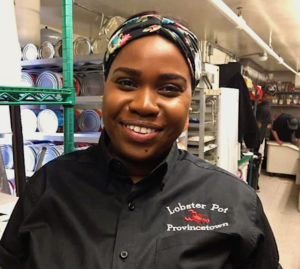PROVINCETOWN — Freda Powell has been coming from Jamaica to work at Marine Specialties on Commercial Street every year since 1998. Like many other seasonal workers on the Outer Cape, she comes here via the government’s H-2B visa program, and she is grateful for the opportunity.
“Money from here is sent home to family for medication, rent, and all of that,” Powell says. “If you don’t come it’s really hard.”
Though the H-2B program has been a boon both to workers like Powell and to employers faced with a serious labor shortage, it comes with high doses of uncertainty and frustration. Sponsoring visas for employees is costly and the process difficult, especially for smaller businesses. Even with all the paperwork in order and properly submitted, there are no guarantees that the effort and expense will pay off. Some businesses have had to delay spring opening or end their season early for lack of staff.
When domestic workers can’t be found, H-2B visas allow companies to bring foreign workers to the U.S. for temporary nonagricultural jobs. But changing rules and a federal government that is hostile to immigration have raised fears among workers about traveling to their home countries. As a result, finding winter work for their H-2B staff so that they can remain in the U.S. is now a regular part of employers’ summer schedules.
A random process
Congress has set the annual H-2B visit limit at 66,000, but that total gets split between the summer and winter seasons with 33,000 each. Employers must submit their visa requests by the deadline and they’re randomly ordered for processing. That’s the last step in a lengthy process that puts employers across the country in a tense holding pattern while the system works. Missing out means no H-2B workers and a tough season ahead.
Marine Specialties has been sponsoring H-2B workers for over 20 years. “We would be struggling to staff our store in the peak season without them,” says manager Nicolas Patrick. He says there simply aren’t enough people in the area to fill all their open spots. Advertisements that are required by the program get no responses. Like many H-2B businesses, Marine Specialties brings back the same people year after year.
“They’re excellent,” says Patrick. “They love working here, and we love having them. They’re part of the family.”
Before they can share the love, the odds of hitting the visa lottery are long. Many businesses seek legal help with the detailed documentation that is required, significantly adding to the expense.
But employers desperate for help aren’t the only ones overwhelmed by the system. In January 2019, the application website crashed within minutes of going online. U.S. employers had made more than 96,000 visa requests for the 33,000 spots and processing stopped. That was 30 times the number of requests at the same time the previous year. Under pressure, the government authorized an additional 30,000 visas — but even that number left many critically understaffed.
Late openings, early closings
The Lobster Pot in Provincetown has been sponsoring H-2B visas for nearly three decades. Owner Tim McNulty knows how important these workers are, but time constraints continue to be a problem.
McNulty says that the uncertainty of the lottery and the cost of the program puts stress on his operation. For the last two years the Lobster Pot has opened a month later than he would like, as there is simply not enough help. In past years the business was open until Thanksgiving. Now the exodus of workers who must leave to accommodate the start dates of employers sponsoring their in-country extensions makes staying open that late impossible.
Tamara Robinson is in her fifth year of seasonal work in the U.S. on an H-2B visa. It’s helped her pay off student loans back in Jamaica, but she also knows the stress of leaving for a season of hard work. “It’s not ideal but you do what you have to do because the job situation back home is very difficult,” she says. Mostly she is proud of her accomplishments. “It’s worth all the sacrifices I had to make.”

Positive change may be on the horizon. Winter resorts have the opposite peak season from the Cape, so destinations like Stowe, Vt. used to be ideal staffing partners. But waves of consolidation have swept the ski industry, along with a movement away from H-2B staffing. With those partners stepping back, Cape businesses have had to look elsewhere for reciprocal staffing arrangements.
Today, many Florida country clubs are taking a closer look at having H-2B partners. They’re attracted to the in-country option, which gives workers a three-year window to work in the U.S. Under H-2B rules, out-of-country visa holders must leave the country by the end date declared by their employer. To have them return each year, the employer must file a new visa request. The in-country extension allows workers to stay in the U.S. for three years before they must exit, as long as they have a sponsor for each season.
Shirlene Industrious is director of human resources for the Club at Mediterra in Naples, Fla. Having a trained team of workers every season is a top priority for her. With in-country extensions she can potentially have the same team in place for three years.
Industrious is in her second year of working with H-2B staff and finds the quality of the workers makes a big difference. “Because they’re already experienced, the biggest part of training was teaching them the Mediterra way,” she says.
From the frustration and lack of certainty that haunts the H-2B program, this migration to in-country petitions may be the answer to staffing shortages, at least for the time being.
At the Lobster Pot, Tim McNulty has hope. “As stressful as it is to work the in-country system,” he says, “we’re at least guaranteed workers for the 2020 season. I think it’s actually gotten better only because it’s gotten clearer.”



